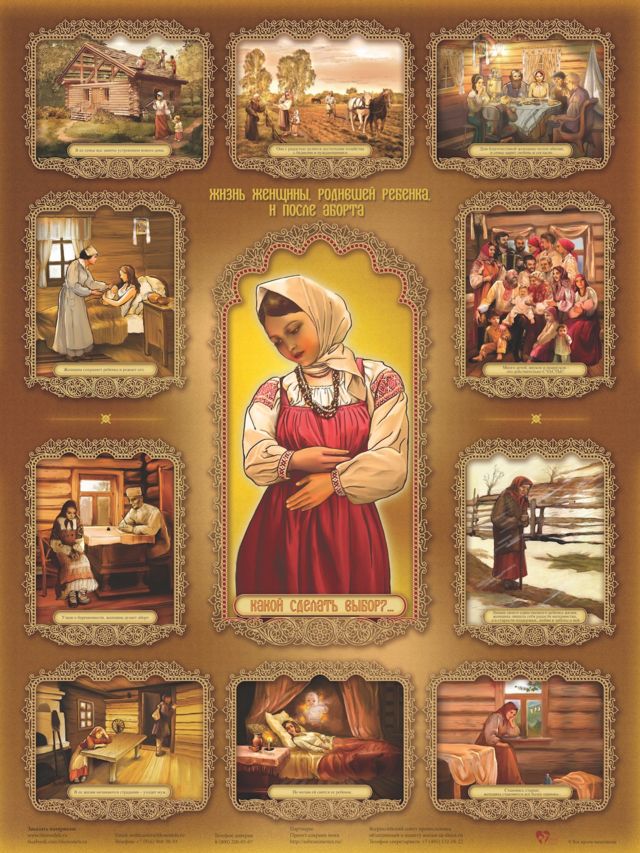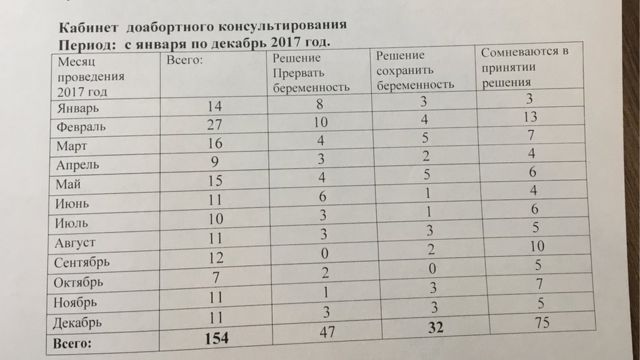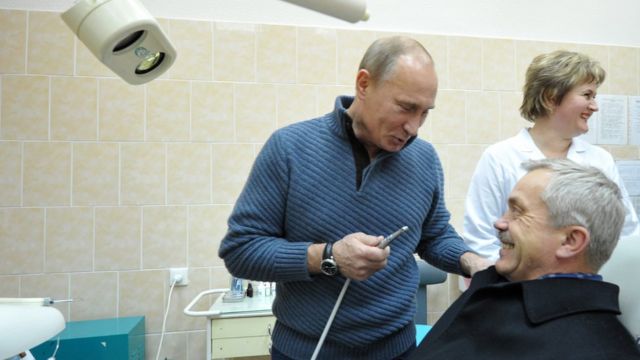Medicine in the Belgorod region: In 2011, Putin visited a local hospital and put the governor in a dentist’s chair. For more than five years, women in the Belgorod region have been required to talk to an Orthodox priest and a psychologist before having an abortion. Without their signatures, some doctors refuse to perform the procedure. The BBC’s Russian Service has learned how this system works and what it leads to.
The governor of the Belgorod region, Yevgeny Savchenko, has long wanted to make his region a spiritual center of Russia. An agronomist by training, he worked in collective farms, the Communist Party, and the Ministry of Agriculture before being appointed governor in 1995. Savchenko, 68, has ruled the region for three decades, and last year was in office for the seventh time. During this time, Savchenko became religious and passed the country’s only law on spiritual security. According to it, clients of prostitutes in the Belgorod region will be fined, and the celebration of St. Valentine’s Day and Halloween in schools and universities is banned. Savchenko, the leader among regional leaders, limited the sale of alcohol, which later spread throughout Russia. Under the same law on spiritual security, concerts by rappers Noize MC and Face are banned here, along with musicians playing in the genre of “heavy metal”, which is considered “spiritually dangerous”. Performances by contemporary playwrights such as Ivan Vyrypaev and Yevgeny Grishkovets were canceled. Philosopher Alexander Dugin, a Savchenko sympathizer known for his right-wing views, calls the Belgorod region “the most Russian in Russia.” There are more than 150 churches in the region, most within walking distance. Every hospital has a temple, a church, or a chapel; priests attend school proms and September 1 celebrations. Savchenko, who advocates an enlightened monarchy, has long known Patriarch Kirill. He has stated that his goal for his final term as governor is to transform the region from a “material” to a “creative-spiritual matrix.
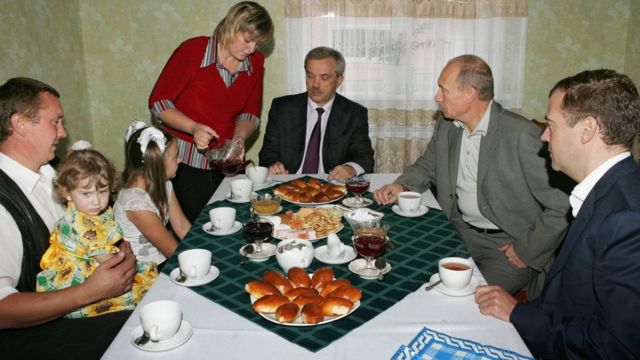
Putin and Savchenko drinking tea at a Belgorod family’s home in September 2007. One of Savchenko’s main goals is to reduce the number of abortions. The governor has repeatedly told district heads that demographic indicators are the main criterion for evaluating their work. He urged officials to “carry out educational work among women about abortion. “We must understand the situation of abortion and convince everyone who is considering it – they should give birth. It is a lesser sin to reject the child than to kill it. We have to choose the lesser of two evils. After all, our system works well – there are waiting lists in orphanages to adopt a child. So let them give birth,” Savchenko said at a government meeting. Ideally, according to the governor of Belgorod, women born in the 1970s should give birth to “at least one child,” those born in the 1980s – two children, and those born in the 1990s – “at least three.” “We have to work with each of them, work and work. We must work with families, understand their needs,” Savchenko stressed. According to the authorities’ plan, the number of abortions in the region should decrease by 20% by 2025 thanks to “preventive work”. What kind of work is it? “I have been doing this for five years. Doubting women and convinced materialists come to me. These are very difficult talks. They argue. They say, you don’t understand, until a few weeks it’s just an embryo and [abortion] can be done. But this is not your life. It is not an ant, it is not an animal, it is a human being. The person is just trying to silence his conscience with such discussions,” Archpriest Yevgeny Kolesnikov worries.
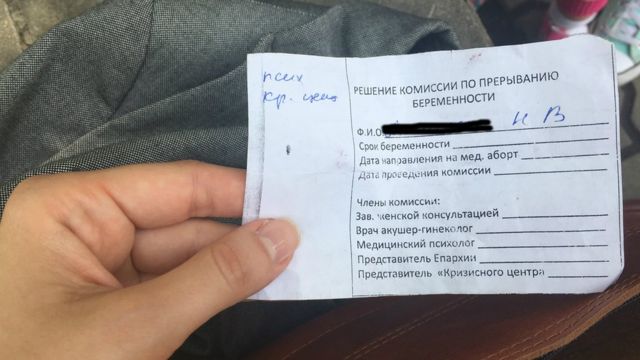
This is what a bypass list looks like, as shown by one of the residents of Stary Oskol. We explain quickly, simply, and clearly what happened, why it matters, and what will happen next. The number of offers should remain: Episodes The end of the story: Advertising Podcasts “I told everyone at the beginning that my signature could in no way be seen as an endorsement of abortion,” says Fr. Evgeny. “It is simply a sign that the woman came and we had a conversation. But there were cases where I couldn’t write anything at all. I felt I had no moral right to do so, because I understood that the woman interpreted it as my permission. And I tell her – the decision is up to you in the end. Of course, if I don’t sign, I feel that the insult remains deep in the woman’s soul. But even without the priest’s signature, you are legally obligated to do it. On a May evening in 2017, Maria Buzayeva came to see Father Evgeny in the snow-white Temple of the Nativity. She already had three sons – four-year-old Pasha, three-year-old Yegor, two-year-old Nikita, and recently she learned of her fourth pregnancy. It was unplanned: Buzayeva forgot to take her birth control pill on time. They didn’t plan to raise the fourth child, and her husband said, “Only abortion. She told all this to the priest, holding a bypass form in her hands. It already had the signature of a psychologist from the crisis center, the matter was in the hands of the priest. “He lectured me and said he wouldn’t sign anything. He says he’s still young and doesn’t want any more kids. And I told him – I already have three, where else! He didn’t sign. And how could I understand him? When I came home, my husband didn’t believe it, he started yelling, “What nonsense they’ve come up with, what permission,” he says. The next day Buzayeva went to the temple again. Without her husband – there was no one to leave the children with. “I went in, stood there and looked at him” – Maria didn’t immediately remember the priest’s name, confused him with the priest who baptized her middle son Egor on the same days. “Miss, we talked about this yesterday. I cannot sign anything like that,” – said Father Evgeny. Buzaeva went for a consultation. According to her, the doctor first refused to see her without a referral. Then it turned out that the pregnant woman had bad test results. “While I was paying for all the tests and treatment, the doctor said it was too late for the surgery, especially since the paperwork had not been signed,” Buzayeva recalls. Dr. Lyudmila Bredikhina, looking down at the floor of the women’s consultation room at the central district hospital in Stary Oskol, told a BBC correspondent that she “couldn’t forbid anyone anything,” that “women often don’t know what they want,” and that it was possible that “infections should have been treated before the operation.” The nurse added, “The region certainly needs to reduce the number of abortions, but it all depends on how it is done. Counseling against abortion in the Belgorod region has been going on for more than five years. However, residents of other regions of Russia have only recently learned about the commission of a doctor, a psychologist from the Women’s Crisis Center, and a priest that women must go through before having an abortion in Belgorod. A resident of Stary Oskol posted a photo of a blank form with a list of specialists and lines for their signatures on one of the websites. She shared her story with the BBC. “In 2011, I had already had an abortion. I wanted a second child, but the stitches from the first C-section had not yet healed, and it was not possible to give birth. At that time there was no talk of a commission, I was given a referral and that was it,” recalls Galina (name changed), a mother of two. “Now I went to the doctor in almost the same condition – my youngest daughter is only one year old, the condoms failed, but instead of a referral for an abortion, I got this note. And they even asked me why I didn’t want to give birth. I was outraged. Are you serious, I asked? And they said, “Yes, we won’t give you permission to go to the hospital without these signatures. Well, I didn’t go anywhere, of course. I don’t need pro-lifers [people who want to ban abortion] to interfere in my affairs, I’m a non-believer, I have nothing to do with that. Galina’s story made the news and a scandal erupted. “It is surprising how they reacted to this unique experience. Instead of the federal TV channels coming and filming a story about this unique practice, which brings results and saves lives, they put us in a defensive position,” says priest Nikolay Dubinin in a conversation with the BBC. The rector of the city church in Stary Oskol, a father of five children, has been working for five years in the hospital church, where he has been doing pro-life counseling. We met at the cultural center where his wife was awarded the Order of Maternal Glory of the First Degree on Family Day.
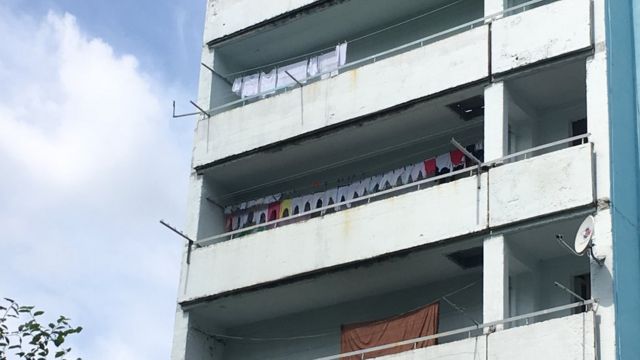
The salary of the residents of Stary Oskol is not high enough to buy children’s clothes on a regular basis. “For five years, they never came to us and said, ‘Tell us, this is such an amazing phenomenon! Instead, they are now telling us that we are interfering in other people’s lives, that we need to justify ourselves,” he says. “I understand the priests who do not sign these questionnaires. The priest just cannot bring himself to do it. Of course, these women can insist on an operation in the hospital.” “I admit that the gynecologist could have told Galina directly: go, go through the commission. I don’t exclude the human factor,” adds Father Nikolai. “But it should be understood that no one can give a basic permission or prohibition – it is her constitutional right. In general, this consultation was long and without signatures, for example, in our hospital we didn’t sign anything”.

Rice, buckwheat, a bottle of oil – this is how pro-lifers can help parents in need. In the center there are 800 client families. “Angel” believes that in 2017, 154 women came to them with the intention of having an abortion, and 32 of them decided to keep the pregnancy – these are the ones who returned to the crisis center with a child after giving birth. Agnostics, Muslims and people of other faiths have the right not to go to priests, says Father Nikolai. “But Muslims generally do not have abortions. But sometimes Muslim women come anyway. They are much more respectful than many Orthodox Christians. And a person who blesses Easter eggs will sit and argue that she has the right to kill. They argue and argue a lot. But are we going to come to the terrible judgment of God with the Constitution of the Russian Federation or with a declaration of rights and freedoms and say, “Look, Lord, here it says”? says Father Nikolai. There are many active pro-lifers in the Belgorod region. Drawing teacher Kristina Yudina has been involved in anti-abortion campaigns in Belgorod since 2013, and has opened a branch of the all-Russian pro-life movement ANO “For Life” in the region. “We walk the streets showing this,” she says, pulling a pink, velvety, soft mock embryo from her bag. Russian pro-lifers order special rubber dolls from like-minded people in the US.
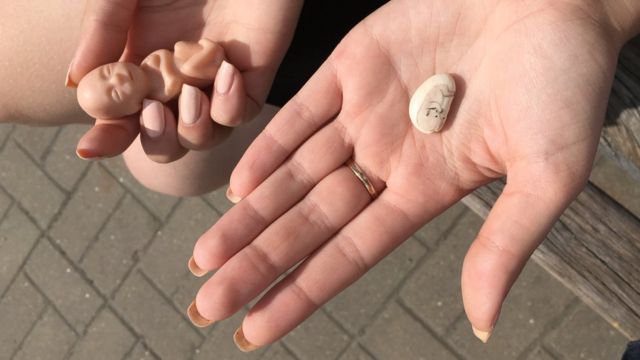
The “For Life” activist uses visual aids to demonstrate how to convince women to refuse abortion. A set of three models, including delivery, costs about 14,000 rubles. The money is raised by supporters of the anti-abortion movement and sent free of charge to women’s health clinics, priests and private gynecologists in the regions, so that they can show them to women who want to have an abortion. Activists in Belgorod also draw embryos on kidney beans themselves – according to Yudina, this is what a fetus looks like in the sixth week of development. “Young people are afraid to pick it up. One woman was indignant that we approached passers-by, she said that she herself had abortions and it was normal, she argued that there was nothing inside at an early stage. And we tell her – close your eyes and put out your hand. And we put this embryo in her hand.
